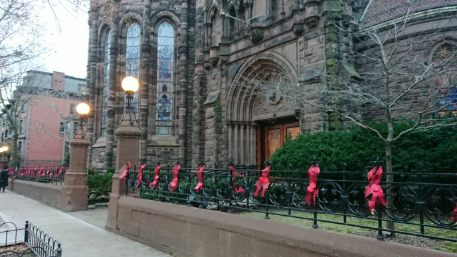
For the last several years, during the last weeks of November, a row of red ribbons grows on the iron fence of St. Augustine parish in Park Slope. Each ribbon bears the name of a person who died of AIDS.
Last Saturday, Dec. 1, the church hosted an Ecumenical Candlelight Memorial Service organized by the LGBTS Ministry of the parish. This year marked the 30th anniversary of the institution of World AIDS Day.
Father Thomas Brosnan, parochial vicar of St. Augustine parish, welcomed all of the participants. Acknowledging that they were there to remember the people they had lost to AIDS, he told attendees about the days he worked as a volunteer at “Mother Teresa’s AIDS hospital that she started right after the outbreak of AIDS down at St. Veronica’s Church in the village.”
And he told the story of Gregory.
“Gregory was only 26 years old when he came to the hospice, he was in prison for eight or nine years before that. He came as a very angry young man. He converted to Islam during his prison sentence, but he decided to become a Catholic when he was with us and I had the privilege of baptizing him, but the nuns insisted on having the cardinal,” he said.
“Cardinal [John] O’Connor, way back then, came to confirm him at St. Veronica’s … Cardinal O’Connor gave this great homily and he said, ‘Gregory, I want you to know when I confirm you tonight you become a son of the king, and you can come to my house anytime you want.’ Well Gregory took up the cardinal on his offer …
“He made his way to St. Patrick’s Cathedral, made his way right down the center aisle and sat right in the front pew, and the poor usher, I can’t imagine what he was thinking, because I am sure he didn’t want to kick Gregory out, but he came up to him and said, ‘I am sorry sir, but you are going to have to move.’ Gregory didn’t take that well, he got up and said a number of choice words.
“‘Cardinal O’Connor told me I would come to this house and sit in that front pew, I am the son of the king.’ The usher said, ‘That may be true but today the king of Spain is coming and that is his seat.’”
After the introduction by Father Brosnan, Rosemary Grebin Palms read a Prayer from the Prophet Muhammad that asks, “What action is most excellent?,” and answers it with examples that echoed the words of Jesus: “To gladden the heart of a human being. To feed the hungry. To help the afflicted. To lighten the sorrow of the sorrowful. To remove the wrongs of the injured. That person is the most beloved of God who does most good to God’s creatures.”
James Palmaro sang “Beautiful City,” a song by Stephen Schwartz, and recited the poem, “Another Candle,” written by himself. His poem echoed the words of Jesus and Muhammad: “Did you plant a seed? Did you feed the hungry? Did you give to those in need? Could you wait for what you wanted? Do you always have to win? Did you say you were sorry? Did you let a stranger in?”
The event was a remembrance of the dead, the loved ones lost to the epidemic. But it was also a call to action. After the poem by Palmaro, Bob Biegen talked about “the past and the present” of the fight against AIDS.
Kevin Cooper, one of the participants in the service, told The Tablet, “It’s World AIDS Day. It’s a time to recognize, unite, be aware, educate. Right now, there are more youth African-Americans that are being infected because we are not talking about it. We need to talk about it.”
The most touching, dramatic moment of the evening was to follow: Rory Dineen sang the famous Bob Dylan tune “Forever Young.”
After the song, they read the names of the loved one they had come to remember. The reading of the names was followed by a time of silence and reflection.
At the beginning of the evening, in his introductory remarks, Father Brosnan had said that the ecumenical service for World AIDS Day has become a tradition, and he added, “Tradition is the voice of the dead. The dead speak to us from beyond the grave.”
That night at St. Augustine parish, it felt like the voice of the dead was also a voice of hope.
